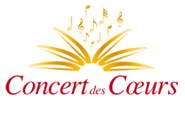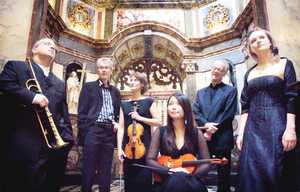During this traditional Christmas concert, the 5th in the harmonious surroundings of this gothic church, the organists and soloists of the ‘Notre-Dame au Sablon’ played Christmas compositions ending the concert with traditional Christmas carols.
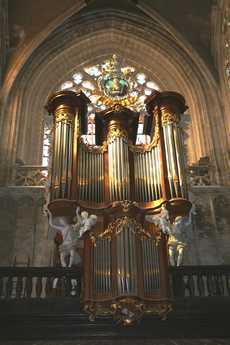
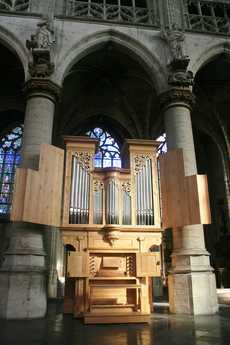 The church has two stunning organs. The grand organ, built by Goynaut in the XVIIIth century, was reworked in the XXth century by the Luxemburg organ builder Georg Westenfelder. This organ has a temperament with four thirds fair that rightly suits the classical French repertoire. The organ is housed in a magnificent XVIIth century organ buffet, the only one remaining in Brussels, produced by the cabinetmaker Jean Van Gelder.
The church has two stunning organs. The grand organ, built by Goynaut in the XVIIIth century, was reworked in the XXth century by the Luxemburg organ builder Georg Westenfelder. This organ has a temperament with four thirds fair that rightly suits the classical French repertoire. The organ is housed in a magnificent XVIIth century organ buffet, the only one remaining in Brussels, produced by the cabinetmaker Jean Van Gelder.
The second one is a choir organ, built by Rudi Jacques from Dinant, who cultivates traditional craftsmanship. This organ, inaugurated in 2011, is complementary to the grand organ, having the same tuning pitch but with a softer temperament (two thirds fair), particularly well suited to German compositions.
Two of the three incumbent organists of the church, Roland Servais and Arnaud Van de Cauter, will play together or alternately.
Aside from the organ, this Christmas concert brings together an instrumental ensemble with two violins (Maia Siberstein and Marrie Mooij), an alto (Madoka Nakamaru), a cello (Michel Boulanger) and a trumpet (Niranjan Wijewickrema). The vocal ensemble is formed by Claire-Hélène Inglese, soprano, and Olivier Berten, baritone.Tijdens dit traditionele Kerstconcert, het 5de in het harmonieuze kader van deze gotische kerk, zullen de organisten en solisten van de Onze Lieve Vrouw ten Zavelkerk composities voor Kerst laten klinken om het concert tot slot te eindigen met traditionele kerstliederen.
Programme
Cantata for the first day of Christmas: “Göttlichs Kind, lass mit Entzücken” - “Divin enfant, venez avec joie” G.P. Telemann (1681-1767)
Georg Philipp Telemann was born in Germany. At 12 years of age, he composed his first opera, Sigismond. While studying law in Leipzig, he founded a college of music. He became an organist in 1704 and composes cantatas for the church. Telemann met Händel in Halle and together they take composition lessons. They will remain friends for life. He also becomes the godfather of one of Bach’s sons. He worked for a long time as organist in Hamburg.
Aria “Et incarnates est” W.A. Mozart (1756-1791)
Mozart was born in Salzburg and died in Vienna. His genius and virtuosity leave nobody indifferent, doesn’t one say the “divine Mozart”? When he was 5 years old he learned to play the harpsichord, then the violin and the organ. Before he was able to read, he already decrypts the partitions. This “Et incarnates est” is an extract from the Mass in C minor in which Mozart brings us to ecstatic heights.
Extracts from Christmas Oratorio J.S. Bach (1685 – 1750)
One of Bach’s three oratorios, this one is composed of 6 cantatas of which 3 for the three days of Christmas. Part of it comes from profane compositions before Bach’s time.
Traditional Christmas carols (in arrangements by John Rutter - 1945)
This Londoner, who also founded his own choir, mainly wrote compositions for choirs. Apart from his profane works, he adapted or harmonized many religious works.
This concert will end with well-known Christmas carols.
De Organisten en Solisten
ARNAUD VAN DE CAUTER
Arnaud Van de Cauter has been incumbent organist of the Church Notre-Dame au Sablon in Brussels since 2004. He studied in Belgium, France and Germany, respectively with professors Hubert Schoonbroodt, Jean Boyer (F) and Harald Vogel (D).
From his earliest days he had been confronted via his father, organist and master of the Chapel of the Abbey of Bonne-Espérance, with issues related to the interpretation of Gregorian chant. Arnaud Van de Cauter studies Gregorian chant with Fabian Lochner (Conservatory of Brussels) and Carlo Hommel (Grand Duchy of Luxembourg).
He then continued his research and was particularly interested in the theses of Marcel Pérès (F), and also, more recently, in the research of Luca Ricossa (Schola Cantorum Basiliensis). He regularly plays as organist with the ensemble Psallentes that was created in 2000 by Hendrik Vanden Abeele (B). He is a Professor of Organ at the St Grégoire Academy in Tournai and at the Music Academy of Rixensart. He is also in charge of the tuition at the Royal Music Conservatorium in Mons (practical harmony and basso continuo), at the IMEP in Namur (specialized methodology for organ) and at the ICHEC Cultures in Brussels (music history). Founder and Artistic Director of the Orgue d’Août festival (Voce et Organo asbl – Brussels), he programs and coordinates since 1997 the organization of the Early Music concerts at the Notre-Dame de la Chapelle Church in Brussels.
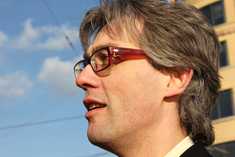 As concert player he very regularly performs in Belgium or abroad, as
As concert player he very regularly performs in Belgium or abroad, as
soloist or chambrist. He has been to the guest of several festivals amongst others BOZAR, the Wallonia Festival and the festivals of Avignon and Toulouse-les-Orgues (F).
Arnaud Van de Cauter recently signed the full work of the Brussels’ composer Peeter Cornet. The latter, buried in the Church of Notre-Dame au Sablon, was the organist at the Court of Albert and Isabella, in the beginning of the XVIIth century.
This double CD received 5 “diapason” stars in the September 2009 edition of the “Diapason” magazine : (…)Arnaud Van de Cauter est parfaitement à la hauteur de la situation, et tout particulièrement dans les difficultés que Cornet glisse dans ses pièces. Sa technique brillante lui permet d'aligner d'impeccables diminutions en doigtés anciens autant que d'intégrer sans heurt une ornementation sophistiquée (...) Van de Cauter semble avoir résolu l'équation pas si simple du disque monographique (Xavier Bisaro). Arnaud Van de Cauter is perfectly up to the task, and more particularly with the difficulties that Cornet tends to slip into his pieces. His brilliant technique allows him, not only, to align impeccable diminutions in ancient fingerings, but also to seamlessly integrate a sophisticated ornamentation (...) Van de Cauter seems to have resolved the not-so-simple equation of the monographic record (Xavier Bisaro).
Photo © Jean Deflandre
ROLAND SERVAIS
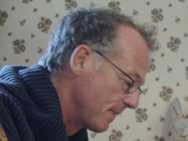 After studying musicology at the University of Louvain-la-Neuve (Bachelor in 1983 and Doctorate in 1996), Roland Servais had the opportunity to attend classes by the organist Michel Chapuis at the Conservatorium of Besançon (final diploma in 1984 and perfection award in 1985).
After studying musicology at the University of Louvain-la-Neuve (Bachelor in 1983 and Doctorate in 1996), Roland Servais had the opportunity to attend classes by the organist Michel Chapuis at the Conservatorium of Besançon (final diploma in 1984 and perfection award in 1985).
At his turn, he teaches organ and history at the Academy Saint-Grégoire in Tournai. He was the Director of the Institut Supérieur de Musique et de Pédagogie (IMEP) in Namur from 1992 until 1998, after that he became the Secretary of its Board.
He also works as the project author for the construction or restoration of organs: he successfully carried out assignments in Mouscron (Anonymous, 1776), Ganshoren (Jacques, 1999); together with Jean-Pierre Felix those of Longueville (Goltfus or Bremser, around 1670), Wavre (Loret, 1856), Gerpinnes (Anonymous, around 1700), Glabais (Gheude, 1854), Leuze (Carlier, 1790), Forest (Smets, 1st half of the XIXth century); together with Benoît Mernier those of Bourgeois (Deblieck, 2001) and Namur (Deblieck, 2006). From 1994 until 1998, upon the request of Minister Robert Collignon, at that time in charge of responsible of Cultural Heritage, he carries out and publishes in ten volumes, with the help of five co-workers, the complete inventory of the organs in Wallonia (over 1,400 organs listed).
Substitute organist at the Notre-Dame au Sablon Church since 1990, he becomes one of the incumbent organists in 2004.
MAIA SILBERSTEIN
Maia Silberstein was born in Davis, California. She starts her career at the age of 16 as soloist performing in Tchaikovsky’s violin concerto with the Sacramento Symphony Orchestra.
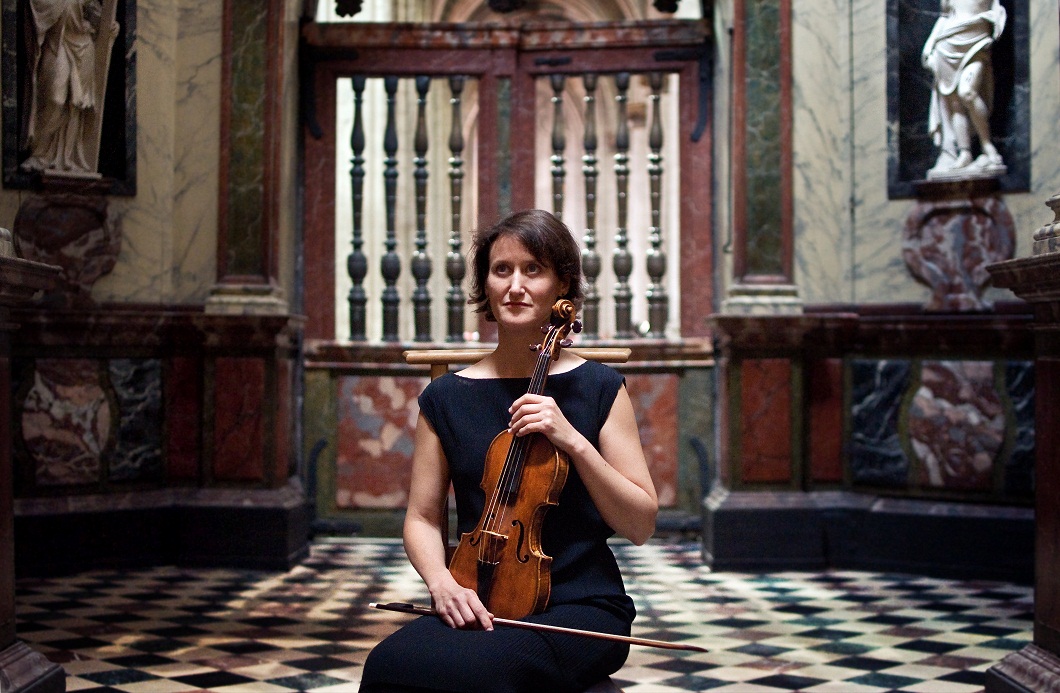 Maia Silberstein obtained a degree in violin at the Cleveland Institute of Music and the Juilliard School of New York. After two years performing with the Sartory String Quartet, she decides to dedicate herself to Early Music.
Maia Silberstein obtained a degree in violin at the Cleveland Institute of Music and the Juilliard School of New York. After two years performing with the Sartory String Quartet, she decides to dedicate herself to Early Music.
Thanks to the support of the Belgian American Educational Foundation and the Vlaamse Gemeenschap, she continues her studentship with Sigiswald Kuijken and François Fernandez at the Conservatoire de Bruxelles and finishes her baroque violin studies with Honours.
In 1999, Maia Silberstein obtains second prize at the Concours International of Schmelzer in Austria. She performs in Europe, Asia, North- and South America with the best Baroque Ensembles, such as La Petite Bande, Ricercar Consor and Les Arts Florissants with whom she makes several recordings. She was asked to be first violin for the Italian Ensembles La Capella della Pieta dei Turchini and Academia Montis Regalis di Mondovi. Maia Silberstein also performs in chamber-music ensembles with artists such as Enrico Gatti, Philippe Pierlot and François Fernandez. She, moreover, founded her own renaissance ensemble, la Zanetta.
MARRIE MOOIJ
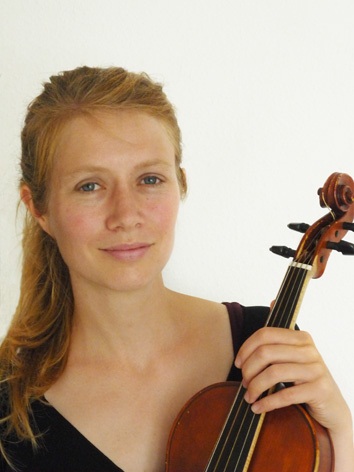 Marrie Mooij was born in Middelburg in the Netherlands.
Marrie Mooij was born in Middelburg in the Netherlands.
She studied modern violin in the Young Talent Class of the Royal Conservatory of The Hague.
While living in The Hague she got in touch with the early music movement and historical performance practice. Her interest in this led her to Belgium, where she in 2007 started her studies of baroque violin at the Royal Conservatory of Brussel, first in the class of Sigiswald and Sara Kuijken and from September 2009 with François Fernandez.
In June 2012 she obtained her Masters degree with Great Distinction. She also received the Ingeborg Köberle Price, an award annually given by the Brussels Conservatory to the two most meritorious students.
She attended several masterclasses with o.a Amandine Beyer, Ryo Terakado, Mira Glodeanu and Alessandro Moccia. She plays regularly with several orchestra’s in The Netherlands and Belgium such as Les Muffatti, La Petite Bande, Ricercar Concort, Concerto Barocco en De Swaen. With her in 2009 founded ensemble Motus Animae she played many concerts in the Netherlands, Belgium and Germany.
In 2011 and 2012 they played at the Utrecht Early Music Festival and Musica Antique festival Brugge (fringe concerts). In 2013 they recorded a CD with music of Munich from the 17th and 18th century.
MADOKA NAKAMARU
 Born in Japan in 1981, Madoka Nakamaru has started playing violin at age of 3.
Born in Japan in 1981, Madoka Nakamaru has started playing violin at age of 3.
She studied violin at Tokyo Geijutsu Daigaku (Tokyo University of Arts) where she obtained her master degree on violin and also encountered early music.
Her interests of early music led her to study baroque violin in belgium. 2006, she was awarded scholarship from Japanese and Belgium government to study with Sigiswald Kuijken and Sara Kuijken at Koninklijk Conservatorium de Brussels.
After she attained master diploma in 2009, she continued to study with Mira Glodeanu and Benoit Douchy to complete her study.
Now as a freelance musician, she has participated in concerts and recordings with various early music ensembles, such as Les Muffatti,(Peter Van Heyghen), Il Gardelino (Jan de Winne and Marcel ponseel), Les agrement (Guy Van Waas), Orchestra Van Wassenaer (Makoto Akatsu),Currende (Eriv Van Nevel) Bach Concentus Muiscum (Ewald Demeyer), Bach Collegium Japan (Masaaki Suzuki), Orchestra Libera Classica (Hidemi Suzuki.)…
Madoka Nakamaru also plays in chamber music group like LinGon, Hildebrandt consort, More Maiorum, Vendetta, Silva Rerum….where she can share her passion and ideas for baroque music with her colleagues.
Her interest in music is not limited to only early music, her performances of the violin concerto by Mendelssohn with Leipzig Kammer Orchestra (2006) was higly appreciated.
MICHEL BOULANGER
From 1983 to 1988 Michel Boulanger studied at the Brussels Conservatory, (Diplôme supérieur in Cello, Diplôme supérieur in Chamber Music and Première prix (First Prize) in Baroque Cello).
Between 1988 and 2002, he pursued studying at the Musikhochschule in Cologne, Germany, and with Jonas Starker at Indiana University, Bloomington, Indiana, USA.
Since 1986, Michel Boulanger has played all over the world with ensembles such as La petite bande, Il Fondamento, L’Orchestre des Champs Elysées, Anima Eterna, Les Agrémens, Il Gardellino, etc. In chamber music, he gives concerts in Europe, Brazil, the United States, Japan and has recorded numerous CDs.
In addition to baroque music, he is also interested in experimental music. He was a member of the ensemble Champs d’action. For a number of years now he has participated regularly in dance, theatre and improvisational productions. He has collaborated with the dancer/choreographers Hervé Robbe (Fr), Louis Zeigler (Fr), Fernando Martin (Be), Matteo Moles (Be), and Claudio Bernardo (Be/Brazil).
In 2002, he participated in “Don’t Shut Me!” a piece by Sarah Goldfarb which fuses music, text and movement. In 2004, he acted in “Beste Vrienden” a theatre piece for children created by the company Luxembourg. He teaches cello at the Academies of Sint Agathe-Berchem and Zaventem, Belgium where he is also experimenting with a course in collective improvisation.
In 2003, he founded Traffik Theater whose mission is to perform high quality musical theater shows for young people. 1983-1988 Studies of cello, baroque cello and chamber music at the Royal Conservatory Brussels, Belgium. 1988-2002 further studies of cello at the Cologne Musikhochschule, Germany and Indiana University,Bloomington, USA with janos Starker. 2002-2012 extensive touring with Europes leading ensemles specialised in historic performance : La petite Bande, Il Fondamento, l'Orchestre des Champs Elysées (Philippe Herreweghe), Anima Eterna, etc. Chamber music concerts throughout Europe, the USA, Japan. several CD recordings. Regular collaboration with experimental dance and music theatre companies. 2003 foundation of TRAFFIK THEATER creation of several music theatre shows for children and performances throughout Europe. www.TRAFFIKTHEATER.COM
CLAIRE-HELENE INGLESE
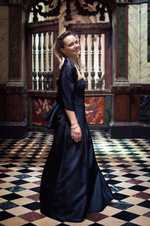 Claire-Hélène (Clara) Inglese is a young lyrical soprano singer of Italian-Belgian origin with a degree from the Conservatories of Brussels and Maastricht (Erasmus exchange) and from the “Institut de Musique et de Pédagogie” in the Belgian town of Namur. She acquired over time a solid musical and scenic experience, both as an instrumentalist (recorder and violin) and as a singer. She had the opportunity to study with major Belcanto singers like Renata Scotto or Nelly Miricioiu, and followed numerous master classes in Belgium, the Netherlands (International Vocal Competition ‘s-Hertogenbosch in 2011), the United Kingdom, in Spain and Italy.
Claire-Hélène (Clara) Inglese is a young lyrical soprano singer of Italian-Belgian origin with a degree from the Conservatories of Brussels and Maastricht (Erasmus exchange) and from the “Institut de Musique et de Pédagogie” in the Belgian town of Namur. She acquired over time a solid musical and scenic experience, both as an instrumentalist (recorder and violin) and as a singer. She had the opportunity to study with major Belcanto singers like Renata Scotto or Nelly Miricioiu, and followed numerous master classes in Belgium, the Netherlands (International Vocal Competition ‘s-Hertogenbosch in 2011), the United Kingdom, in Spain and Italy.
She is studying at the Opera Studio Santa Cecilia in Rome, to which she was successfully admitted in November 2012 to attend an advanced course with Renata Scotto. She was also selected in December 2012 to take part in the concert “Nuovi Talenti 2012" dedicated to Belcanto at the “Auditorium Parco della Musica” (Rome).
Clara lent her voice for a new series produced by the BBC (“Parade’s End”) under the direction of conductor and composer Dirk Brossé. As a lyrical singer, Clara has distinguished herself in several title roles: as Thérèse (“Les Mamelles de Tiresias” by Poulenc) at the Opera Zuid in Maastricht, as Bastienne (“Bastien und Bastienne” by Mozart), as Gretel (“Hänsel und Gretel” by Humperdinck) and as Mabel (“The Pirates of Penzance” by Gilbert and Sullivan) in a production staged by BLOC (Brussels Light Opera Company).
As a performer, Clara has given a large number of recitals, mainly in Belgium and Italy, both as a soloist and in chamber music. She forms with harpist Alisée Frippiat the duo “Arp&Voce”, with whom she performs a vast repertoire of songs and arias. Clara is also a soloist at the “Notre Dame au Sablon” church in Brussels, where she interprets sacred arias and oratorios. Last but not least, Clara regularly takes part in many projects involving contemporary music.
OLIVIER BERTEN
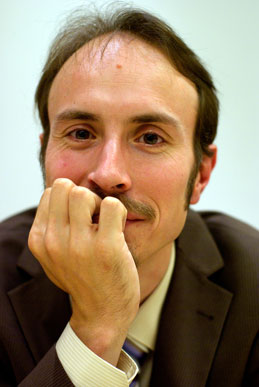 After communication and multimedia studies, Olivier Berten joins the Conservatoire Royal de Bruxelles where he obtains a Higher Diploma in opera singing under Marcel Vanaud. He perfects himself in lied and art song with Udo Reinemann and other famous names in this discipline at the Conservatories of Amsterdam, Metz and Brussels. He studies baroque singing with Monique Zanetti and Greta De Reyghere. During the 2004-2005 season, he is member of the Operastudio Vlaanderen in Ghent.
After communication and multimedia studies, Olivier Berten joins the Conservatoire Royal de Bruxelles where he obtains a Higher Diploma in opera singing under Marcel Vanaud. He perfects himself in lied and art song with Udo Reinemann and other famous names in this discipline at the Conservatories of Amsterdam, Metz and Brussels. He studies baroque singing with Monique Zanetti and Greta De Reyghere. During the 2004-2005 season, he is member of the Operastudio Vlaanderen in Ghent.
He regularly performs on opera scenes in Brussels (Eliogabalo, Werther, Orlando furioso), Flanders (Villa Vivaldi) and Wallonia (Ne criez pas au loup and Sybil et les silhouettes). He also works with ensembles like the Liège Philharmonic Orchestra (L’enfant et les sortilèges) or the Flanders Symphony Orchestra (Rossini for kids) and la Petite Bande (Mattheüspassie). He is a regular member of the Scherzi Musicali, Vox Luminis and Cappella Pratensis ensembles. The recordings he shares with them are very much appreciated by both the critics and the audiences.
NIRANJAN WIJEWICKREMA
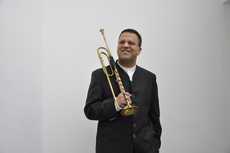 After the Academy of music of Grez-Doiceau, Niranjan Wijewickrema studied music at the Royal Conservatory in Brussels and Mons and won the first prize of music theory, history of music and written harmony, and graduated in specialized music theory.
After the Academy of music of Grez-Doiceau, Niranjan Wijewickrema studied music at the Royal Conservatory in Brussels and Mons and won the first prize of music theory, history of music and written harmony, and graduated in specialized music theory.
He studied trumpet with Pierre Thibaud (Paris) and Jerome Callet (New York) and obtained a diploma in trumpet at the IMEP in Namur (Antoine Acquisto class), as well as a degree of orchestra trumpeter at the Hochschule für Musik in Köln, in the class of Friedemann Immer.
Niranjan Wijewickrema then specialized in baroque trumpet with Friedemann Immer at the Hoogeschool voor Kunsten van Amsterdam.
As a member of the Tuba Mirum or Director of the Belgian Baroque Soloists, he regularly performs in Germany, Austria, Belgium, France, Spain, Italy, Poland, Czech Republic and the Netherlands.
Niranjan Wijewickrema is currently a PhD student at the Universität für Musik in Karlsruhe.
